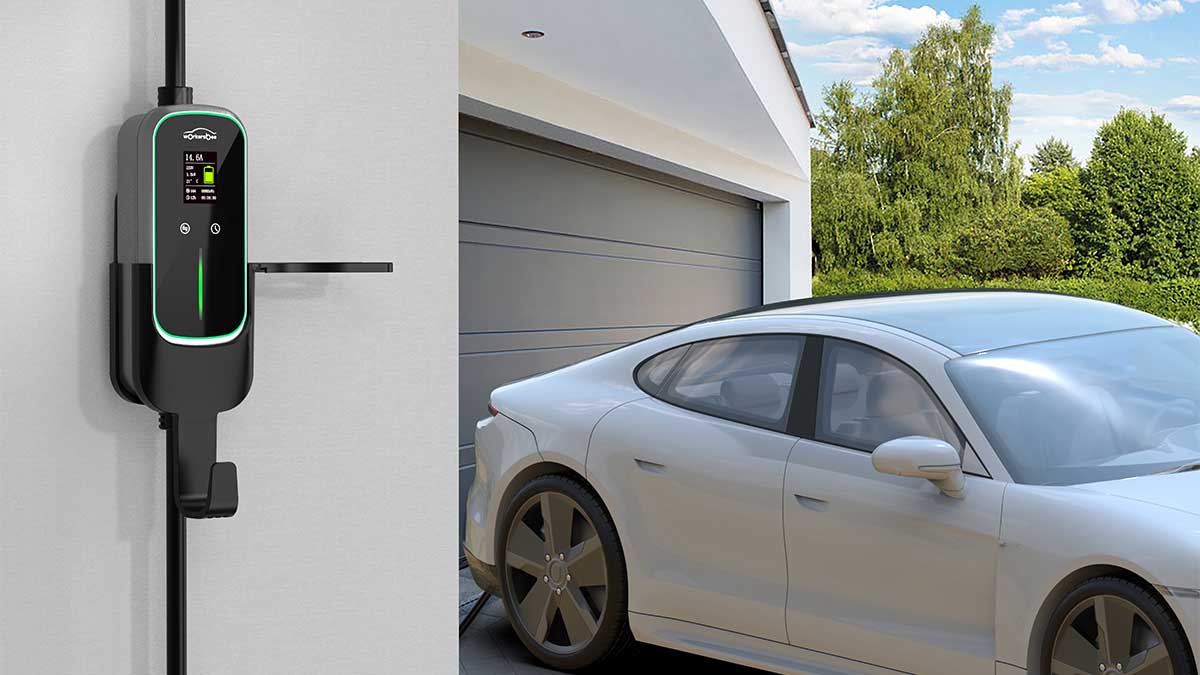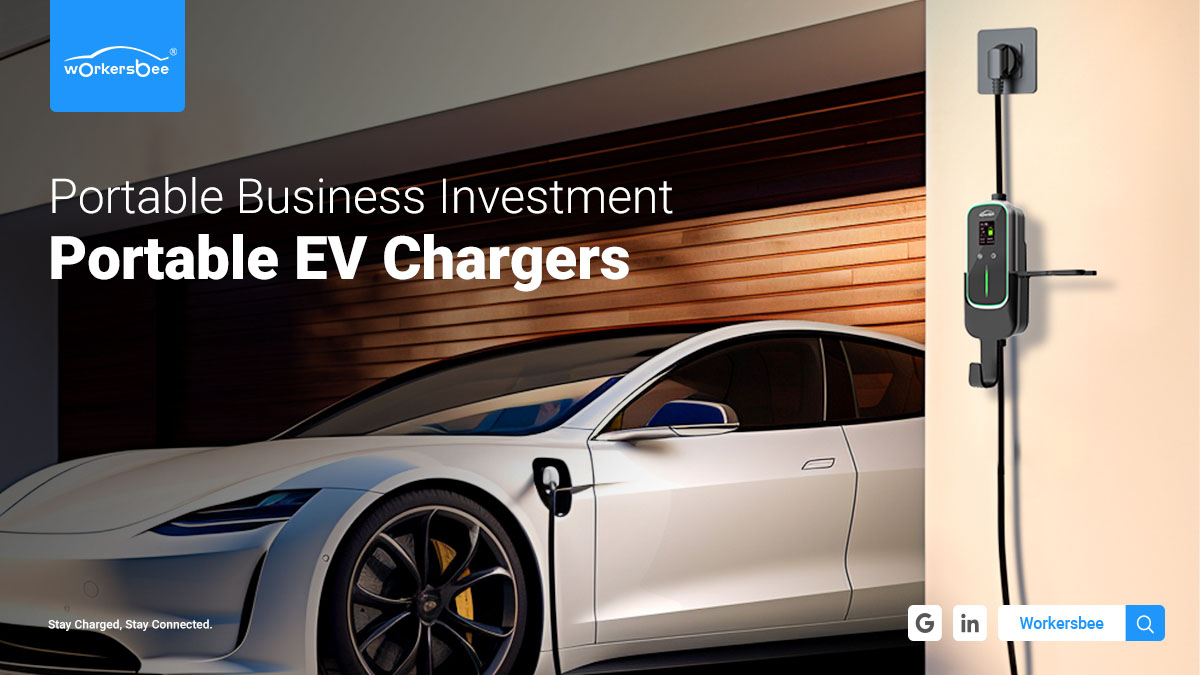 Can You Get Portable Electric Car Chargers? A Complete Guide in 2025
Can You Get Portable Electric Car Chargers? A Complete Guide in 2025
Sep 05, 2025
With the rise of electric vehicles (EVs), many car owners are wondering if they can use portable EV chargers. These chargers offer the flexibility of being able to charge an EV on the go, whether at home or in emergency situations. But are they a reliable solution? In this guide, we’ll answer some of the most common questions about portable EV chargers, helping you make an informed decision.
1. What Is a Portable EV Charger?
A portable EV charger is a compact device designed to charge electric vehicles via a standard electrical outlet. Unlike fixed, wall-mounted chargers, portable chargers can be used anywhere there's access to a power source, making them a great option for drivers who need flexibility or are traveling.
These chargers typically connect to either a 120V (Level 1) or 240V (Level 2) outlet. While they may not charge as quickly as dedicated home or public charging stations, they provide convenience when other options are unavailable.
2. Is a Portable EV Charger Safe?
Yes, Portable EV chargers are typically safe for use, offering a convenient solution for charging your vehicle when you don’t have access to a fixed charging station. They come equipped with built-in safety features such as overcurrent protection, temperature regulation, and automatic shutoff in case of a fault. However, it's essential to always follow the manufacturer's guidelines closely to ensure safe operation and avoid potential risks.
As with any electrical appliance, it’s also essential to use the charger with properly rated outlets and ensure it’s in good condition to avoid potential hazards.
3. How to Charge an Electric Car in an Emergency?
In emergency situations, having a portable charger can be invaluable, offering a practical way to keep your vehicle charged and prevent being stranded without power. If you're stranded with a low battery and don’t have access to a traditional EV charger, you can plug a portable charger into any standard electrical outlet. Keep in mind that charging with a portable charger is slower than using a dedicated charging station, so it’s best used to provide enough charge to reach a proper charging station.
Portable chargers are perfect for emergencies, but they may not be the fastest option for regular use.
4. How to Charge a Car Without an EV Charger?
If you don't have a dedicated EV charger or nearby charging station, there are a few options to keep your vehicle powered:
Use a standard household outlet: A regular 120V outlet will charge your car, but the process will be very slow (Level 1 charging).
Portable EV charger: If you have a portable EV charger, you can use it to charge from any standard outlet.
While a portable charger provides a temporary solution, it may not be ideal for regular, long-term use due to the slower charging speeds.
5. Can You Buy Your Own EV Charger?
Yes, You can indeed purchase an EV charger for personal use. Many EV owners choose to install a home charging station for more convenience and faster charging speeds. However, if you prefer flexibility, a portable charger can be a more convenient solution for charging your EV when away from home.
Portable chargers are especially useful for EV owners who don’t have a dedicated charging station at home or who need a backup option while traveling.
6. What Is a Granny Charger?
A "granny charger" refers to a basic, low-power charger that connects to a standard 110V outlet. These chargers are called "granny chargers" because they are slow and typically used in emergency situations when no other charging options are available. While convenient, they can take a long time to charge an EV fully.
For more efficient charging, EV owners may opt for faster charging solutions, such as Level 2 chargers or portable chargers designed for quicker power delivery.
7. Are There Still Free EV Chargers?
Yes, While some public charging stations still offer free charging, this option is becoming increasingly rare as more networks begin to charge for their services. Many charging networks now charge for usage, and free charging stations are usually found at public locations such as shopping malls, libraries, and some workplaces.
For more convenience and control, many EV owners choose to install a home charger or use portable chargers for charging at home or on the go.
8. How Much Is It to Install a Charging Port for an Electric Car?
The cost to install an EV charging port can vary depending on several factors, such as the type of charger (Level 1 or Level 2), the location of the installation, and local labor costs. Typically, installing a Level 2 home charging station can cost anywhere from $500 to $2,000, including installation.
For those who want to avoid installation costs, a portable charger provides a cost-effective solution that doesn’t require permanent installation.
9. What Is the Difference Between Type 1 and Type 2 EV Chargers?
Type 1 and Type 2 refer to different types of connectors used for EV charging:
Type 1: Primarily used in North America and Japan, featuring a 5-pin connector.
Type 2: Common in Europe, this 7-pin connector is the standard for newer global EV models.
It's important to ensure that the charging cable you use is compatible with your EV's connector type.
10. Can I Get a Home EV Charger Without a Driveway?
Yes, you can still install an EV charger without a driveway. If you have access to a power outlet in a garage or a nearby wall, you can easily install a home charging station without the need for a driveway. However, installation may require running a cable from the outlet to the car.
For those without a dedicated charging setup, a portable charger provides a flexible and cost-effective alternative, allowing you to charge your vehicle from any available outlet.
11. Can You Charge an Electric Car with a Portable Solar Panel?
Yes, it’s possible to charge an electric car with a portable solar panel, but it’s generally a slow process and depends on sunlight conditions. Portable solar panels can provide a small amount of power to an EV, which is useful in remote areas or during outdoor activities. However, for regular use, solar panels alone may not provide sufficient power.
For a more consistent charging experience, many EV owners combine solar panels with traditional charging methods.
12. Can I Keep a Portable Charger in My Car?
Yes, you can store a portable EV charger in your car. In fact, it's a good idea to carry one, especially during long trips or when traveling to areas without reliable charging infrastructure. A portable charger can provide the peace of mind that you’re never too far from a power source.
With its compact design, a portable EV charger is easy to keep in your car, ensuring you're prepared for unexpected situations.
Portable EV chargers provide a flexible and reliable solution for electric vehicle owners, whether charging at home, on the road, or during emergencies. While they may not offer the fastest charging speeds compared to dedicated home chargers, they ensure you’re never left stranded without power.
At Workersbee, we offer a range of portable EV chargers, each designed to meet the needs of modern EV owners. Our products, such as the Flex Charger 2 and the Adjustable 7.4kW Home EVSE, combine advanced technology with user-friendly features, offering efficient, safe, and reliable charging on the go. With features like adjustable current settings, durable construction, and compatibility with various EV models, our chargers are perfect for any situation.
As a company with robust R&D capabilities, Workersbee is committed to delivering cutting-edge, high-quality charging solutions. With over 18 years of experience, we continue to innovate and provide products that adhere to the highest safety and performance standards. Whether you’re at home, on the road, or in an emergency, our portable chargers ensure you’ll always have a dependable source of power for your EV.
Read More

 Can You Get Portable Electric Car Chargers? A Complete Guide in 2025
Can You Get Portable Electric Car Chargers? A Complete Guide in 2025
 2025 Guide to Portable EV Chargers: Types, Features, and Safety Tips
2025 Guide to Portable EV Chargers: Types, Features, and Safety Tips